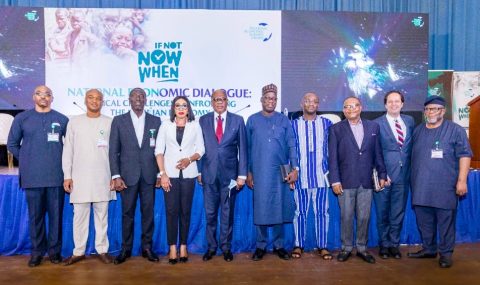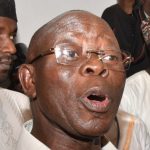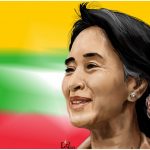NESG Sets Agenda For 2023 Polls In Nigeria
Latest Headlines, News Across Nigeria Sunday, May 22nd, 2022
(AFRICAN EXAMINER) – Ahead of the 2023 General Elections in Nigeria, the Nigerian Economic Summit Group (NESG) has proposed a six-point agenda to nudge the country’s prospective political actors towards meeting the immediate yearnings of Nigerians and effecting sustainable economic change.
The NESG’s six-point agenda urges government to rethink what socio-economic development outcomes mean for an average Nigerian, rethink the role of market and the private sector and deepen sectoral reforms to support broad-based growth and competitiveness
Other points of the agenda call on the nation’s leadership to facilitate integrated national and sub-national approach to economic inclusion and development, pragmatic and actionable social sector reforms and develop workable and inclusive national security strategy in all dimensions.
This was disclosed at the group’s National Economic Dialogue which held in Abuja on Friday. The event was attended by high-profile political leaders, private and public sector stakeholders, civil society and academia.
Chairman of NESG, Asue Ighodalo said the process by which parties select their candidates during the primaries and the characteristics and capacity of persons chosen were crucial to the Nigerian dream.
“The Nigerian government has a pivotal role in addressing, with utmost urgency, six critical challenges causing economic dysfunction. These challenges are non-inclusive economic growth, macroeconomic stability, infrastructure deficit, human capital deficit and skills gap, national insecurity and weak economic competitiveness.
“We, the citizens, need to pay attention to the quality of our political system, processes, institutions and economic reforms. Our collective responsibility is to deliver a first-world country with happy and safe citizens. This is a call to national service. We must all be more involved, more selfless and tolerant, acting in the national interest”, he said.
While speaking during the panel session of the Dialogue, the Director of the Institute for Development Studies, University of Nigeria, Professor Osita Ogbu noted that enough emphasis is not placed on inequality in Nigeria. Inequality, according to him, undermines the trust, solidarity, and mutuality on which good citizenship is based.
“Once you have a non-inclusive growth economy, it’s a recipe for what we are already observing in this country. Poverty is pervasive; inequality is pervasive. It is not just a simple matter: there are few rich people and many poor people.
“It’s a matter of citizenship. It’s a matter of how can you expect people who do not have a stake in the country to regard themselves as citizens of this country?
When people ask, what do we do to fix the economy, I always say fix the politics first. If you fix the politics, that’s a major step towards fixing the economy because major economic decisions are made by politicians”, he added.
Senior Partner at Olisa Agbakoba Legal, Dr Olisa Agbakoba observed that when bad leadership ceases to have an effect, then the effect of bad leadership will cease. “Why is it that from 1960 till date, barring one example or two, we have failed in leadership? If the head cannot absorb what is being said, nothing will happen. There can be no Nigerian dream without a visionary president”, he stressed.
Similarly, the Executive Director, YIAGA Africa, Mr Samson Itodo, who was also one of the panelists at the Dialogue, said if you have a political process that is highly commercialised, plays with a deficit of ideas competition, and is exclusionary of the vast majority of people, what you have at the end of the day is a ruling and political class disconnected from reality.
“The conception of public leadership needs to be reviewed, revisited and redesigned. We need a new political mobilisation strategy to sensitise Nigerians on why it is crucial to elect good leaders. We need to amplify the need for us to register and cast our votes. Voters in 2023 need to be informed voters who understand the issues”, he further stated.
The need for the government to partner with the private sector to effect positive socio-economic outcomes was also emphasized at the Dialogue. This demands a free-market orientation to support growth and inclusion, ensure appropriate pricing, and unlock private capital for economic development.
Meanwhile, external imbalances occasioned by the COVID-19 pandemic and the ongoing Russia-Ukraine war provide compelling reasons for countries to look inwards and support domestic value-chain development.
The NESG believes that this is applicable to the Nigerian situation and therefore urges the government to prioritise value-added exports for commodities – particularly agricultural products and oil – to address cross-sectoral value chain constraints and drive economic growth.
Reinforcing the urgency of adopting this strategy, the Resident Representative of International Monetary Fund (IMF) in Nigeria, Mr Ari Aisen said the global economy has been hit by the second shock of the Russia-Ukraine war.
“This puts the economy in a difficult situation. Allowing food production to satisfy the citizenry takes precedence over other priorities. Food security is a big objective, and attention must be paid to this sector so it can provide enough food to keep Nigerians from suffering from the shock disproportionately”, further explained.
Country Director of CARE International Nigeria, Dr Hussaini Abdu said Nigeria is currently experiencing a huge social development crisis., adding that the crisis in the university reflects the larger crisis in the education sector of the Nigerian economy. “The level of investment in healthcare is extremely poor. Seventy-seven percent of health service delivery in this country is out of pocket. This is how health service is being financed in this country, and it does not work anywhere. It means our health insurance system is not working. It only captures a few civil servants, and the poor are not getting good services”, he added.
Also in her contribution, the Managing Director and Chief Executive Officer (CEO) of Endeavour Nigeria, Mrs Tosin Faniro-Dada emphasised the importance of the digital economy and providing support for Small and Medium Enterprises (MSMEs) to scale with adequate infrastructure, power supply and skills development.
Related Posts
Short URL: https://www.africanexaminer.com/?p=77123






















